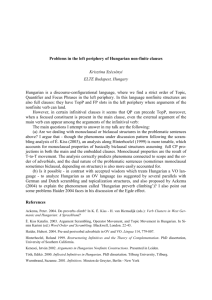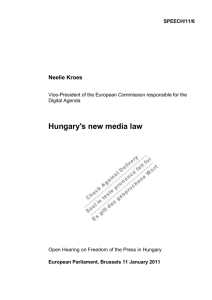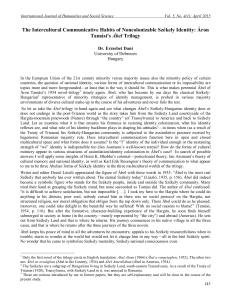“Transylvanian multi-ethnic politics & the role of Roma as malleable
advertisement
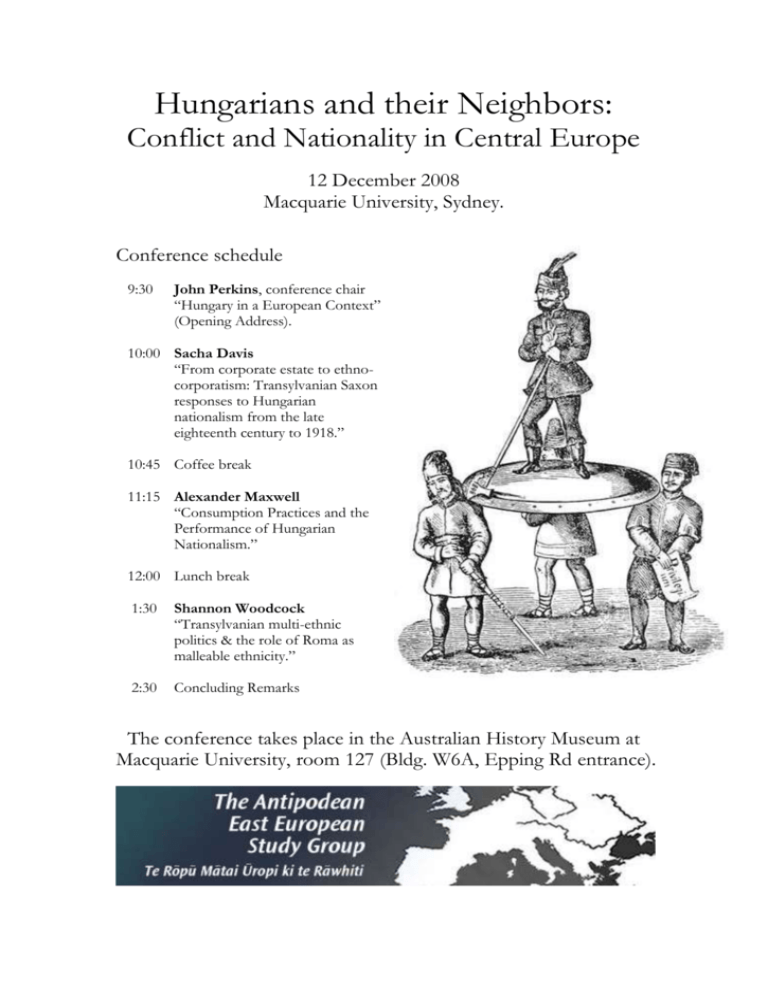
Hungarians and their Neighbors: Conflict and Nationality in Central Europe 12 December 2008 Macquarie University, Sydney. Conference schedule 9:30 John Perkins, conference chair “Hungary in a European Context” (Opening Address). 10:00 Sacha Davis “From corporate estate to ethnocorporatism: Transylvanian Saxon responses to Hungarian nationalism from the late eighteenth century to 1918.” 10:45 Coffee break 11:15 Alexander Maxwell “Consumption Practices and the Performance of Hungarian Nationalism.” 12:00 Lunch break 1:30 Shannon Woodcock “Transylvanian multi-ethnic politics & the role of Roma as malleable ethnicity.” 2:30 Concluding Remarks The conference takes place in the Australian History Museum at Macquarie University, room 127 (Bldg. W6A, Epping Rd entrance). Abstracts “From corporate estate to ethno-corporatism: Transylvanian Saxon responses to Hungarian nationalism from the late eighteenth century to 1918.” Sacha Davis, Newcastle Theories of nationalism poorly describe small/scattered communities that may not be able to express self-determination in territorial form. In this paper I will argue for a theory of ethno-corporatism beyond its current usage as a model for legal rights, suggesting instead that ethno-corporatism provides a means of understanding how small/scattered minority communities understand themselves and respond to the nationalist political environment in which they find themselves. I will demonstrate this by considering the transformation of the Transylvanian Saxons in response to Hungarian nationalism, from a privileged estate to an ethno-corporatist community by 1918. “Consumption Practices and the Performance of Hungarian Nationalism” Alexander Maxwell, Victoria University (Wellington) During the nineteenth century, national politics came to dominate public life in the Habsburg Empire. This paper examines how everyday practices, particularly smoking, dressing, and grooming, became invested with national meaning in Habsburg Hungary during the confrontation with the Habsburg crown. The nationalized history of consumption practices holds considerable interest in its own right, but I pay special attention to the intersection between nationalized and gendered consumption, since the various means for expressing Hungarian patriotism proved gender-specific. “Transylvanian multi-ethnic politics & the role of Roma as malleable ethnicity” Shannon Woodcock, Melbourne This paper traces the historical development of Roma as vital to ethnic politics in the early years of World War Two in Transylvania, a period in which Romanians, Hungarians and Saxons alike dared to re-envisage their villages as part of German, Hungarian and Romanian motherlands on a future post-war map. Needless to say, the deportation of Romani Romanians to the death camps of Transnistria was not considered a shame due to the loss of innocent lives to racist ideology, but due to the inability of Antonescu to recognise the Magyar and Aryan threat as more serious than the Ţigan to Romanian nationalist ideology. For more information, contact: The conference organizer, Alexander Maxwell (alexander.maxwell@vuw.ac.nz) The conference convener, John Perkins (mrjohnperkins@yahoo.com.au)
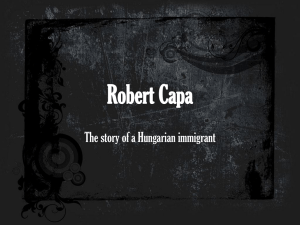
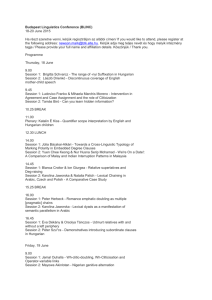
![“The Progress of invention is really a threat [to monarchy]. Whenever](http://s2.studylib.net/store/data/005328855_1-dcf2226918c1b7efad661cb19485529d-300x300.png)


